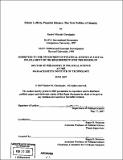Ethnic leftists, populist ethnics : the new politics of identity
Author(s)
Gisselquist, Rachel M
DownloadFull printable version (27.22Mb)
Alternative title
Elections and the new politics of identity in Latin America and beyond
Other Contributors
Massachusetts Institute of Technology. Dept. of Political Science.
Advisor
Roger D. Petersen.
Terms of use
Metadata
Show full item recordAbstract
Group identifications - in particular, those based on ethnicity and class - are central to political mobilization during elections. This dissertation asks: when and why does the salience of ethnic and class categories vary across elections in emerging democracies? It argues that which categories are politicized has less to do with which categories are most salient to voters and more to do with which are most useful to politicians. The strategies of politicians, however, are contrained in a particular ways, by opportunity, which is provided by party system crises, and by the political space, which is given by the structure of existing social identity categories, particularly their sizes and degrees of overlap with traditionally-politicized categories. Given the institutional rules, size and overlap affect which identity groups have the numbers to win and which describe similar constituencies that could be switched between for political expediency. The project nests the theory within an explanatory framework describing four key factors that drive variation in identification: voter preferences, political institutions, party institutions, and elite manipulation. The dissertation presents data from three sources: a fieldwork-based study of Bolivian party politics, focusing on the democratic period from 1982 to 2005; data from the "Constructivist Dataset on Ethnicity and Institutions (CDEI)" on political parties and elections in Latin America in the early 1990s; and four shadow cases from the Andean region (Colombia, Ecuador, Peru, and Venezuela). These data are used to map variation in identification across countries and over time; to illustrate the plausibility of the argument and to test it against predictions drawn from alternative hypotheses; and to explore the generalizability of the argument.
Description
Thesis (Ph. D.)--Massachusetts Institute of Technology, Dept. of Political Science, 2007. Includes bibliographical references (v. 2, leaves 398-434).
Date issued
2007Department
Massachusetts Institute of Technology. Department of Political SciencePublisher
Massachusetts Institute of Technology
Keywords
Political Science.